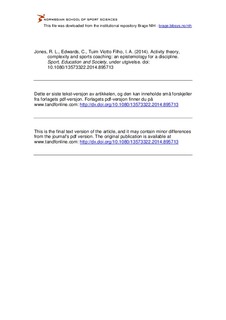| dc.contributor.author | Jones, Robyn | |
| dc.contributor.author | Edwards, Christian | |
| dc.contributor.author | Tuim Viotto Filho, Irineu A. | |
| dc.date.accessioned | 2015-10-27T10:43:40Z | |
| dc.date.available | 2015-10-27T10:43:40Z | |
| dc.date.issued | 2014-03-18 | |
| dc.identifier.citation | Sport, Education and Society. 2014, under utgivelse. doi:10.1080/13573322.2014.895713 | nb_NO |
| dc.identifier.uri | http://hdl.handle.net/11250/2358089 | |
| dc.description | I Brage finner du siste tekst-versjon av artikkelen, og den kan inneholde ubetydelige forskjeller fra forlagets pdf-versjon. Forlagets pdf-versjon finner du på www.tandfonline.com: http://dx.doi.org/10.1080/13573322.2014.895713 / In Brage you'll find the final text version of the article, and it may contain insignificant differences from the journal's pdf version. The definitive version is available at www.tandfonline.com: http://dx.doi.org/10.1080/13573322.2014.895713 | nb_NO |
| dc.description.abstract | The aim of this article is twofold. First, it is to advance the case for activity theory (AT) as a credible and alternative lens to view and research sports coaching. Second, it is to position this assertion within the wider debate about the epistemology of coaching. Following a framing introduction, a more comprehensive review of the development and current conceptualisation of AT is given. Here, AT's evolution through three distinct phases and related theorists, namely Vygotsky, Leont'ev and Engeström, is initially traced. This gives way to a more detailed explanation of AT's principal conceptual components, including ‘object’, ‘subject’, ‘tools’ (mediating artefacts), ‘rules’, a ‘community’ and a ‘division of labour’. An example is then presented from empirical work illustrating how AT can be used as a means to research sports coaching. The penultimate section locates such thinking within coaching's current ‘epistemological debate, arguing that the coaching ‘self’ is not an autonomous individual, but a relative part of social and cultural arrangements. Finally, a conclusion summarises the main points made, particularly in terms in presenting the grounding constructivist epistemology of AT as a potential way forward for sports coaching. | nb_NO |
| dc.language.iso | eng | nb_NO |
| dc.publisher | Taylor & Francis | nb_NO |
| dc.subject | activity theory | nb_NO |
| dc.subject | sports coaching | nb_NO |
| dc.subject | Leont'ev | nb_NO |
| dc.subject | interpretive | nb_NO |
| dc.subject | epistemology | nb_NO |
| dc.title | Activity theory, complexity and sports coaching: an epistemology for a discipline | nb_NO |
| dc.type | Journal article | nb_NO |
| dc.type | Peer reviewed | nb_NO |
| dc.subject.nsi | VDP::Social science: 200::Social science in sports: 330::Other subjects within physical education: 339 | nb_NO |
| dc.source.journal | Sport, Education and Society | nb_NO |
| dc.description.localcode | Seksjon for coaching og psyhologi / Department of Coaching and Psychology | nb_NO |
